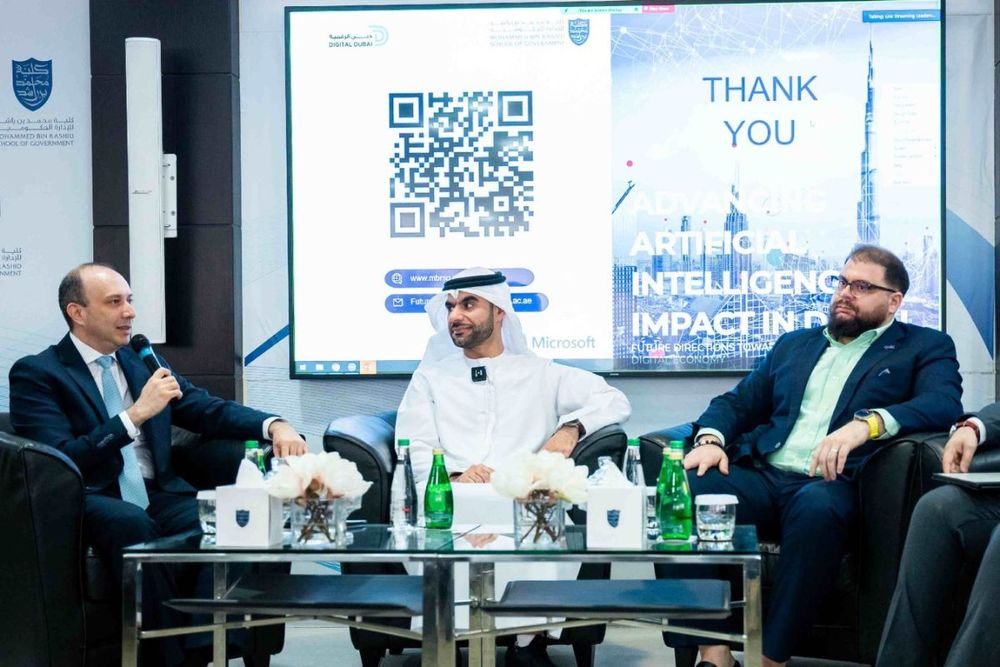In partnership with Digital Dubai and Microsoft, the Mohammed Bin Rashid School of Government (MBRSG) launched a major report on ‘Advancing Artificial Intelligence Impact in Dubai: Future Directions Towards Strengthening the Digital Economy’.
The report represents a major fieldwork and policy study by the MBRSG exploring questions on advancing Artificial Intelligence (AI) utilisation to support the digital economy in Dubai. The comprehensive study identifies key trends, challenges and policy directions related several key pillars of Dubai’s digital economy agenda, focusing on the role of AI as a key component and driver.
The report was launched in an in-person event on Monday, 20 March 2023 at the MBRSG headquarters in Dubai in the presence of Dr. Ali bin Sebaa Al Marri, Executive President, Mohammed Bin Rashid School of Government, and Younus Al Nasser, Assistant Director General of Digital Dubai, and CEO of the Dubai Data Establishment, along with senior representatives from public and private sector entities in Dubai.
Dr Ali bin Sebaa Al Marri, said,
“The Mohammed Bin Rashid School of Government is committed to its mission to train and empower the leaders of tomorrow, and help create advanced, agile governments that adapt to progress and embrace breakthroughs that create better policies and programmes for everyone. As the Dubai government continues to make strides towards embedding AI into its operations and processes, we believe it is our role to support these directions, providing in-depth insights and representative data to leaders and decision makers.”
The key objective of the report on ‘Advancing Artificial Intelligence Impact in Dubai: Future Directions Towards Strengthening the Digital Economy’, is to inform future policies that lead to a thriving digital economy, and pave the way for innovative and ethical adoption of AI and its applications.
For his part, Younus Al Nasser said,
‘This report is particularly timely, following the recent directive from His Highness Sheikh Mohammed bin Rashid Al Maktoum, Vice President and Prime Minister of the UAE, Ruler of Dubai, which emphasises the need to assess new AI technologies such as ChatGPT and their safe utilisation by the government. It empowers our ability to evaluate the impact of these technologies on various strategic sectors—including education, health, and media—and will enable us to comprehend how to implement them safely and effectively. This illustrates the UAE’s commitment to innovation, leadership in adopting the latest technologies, and positively influencing its citizens and residents’ lives.”
The report explored the challenges and opportunities facing companies and organisations who rely on data and digital infrastructures for their day-to-day functions and those who are developing digital and AI products.
Naim Yazbeck, General Manager of Microsoft UAE, commented,
“We applaud the government of Dubai for their forward-looking approach to AI and their intent focus on using new technologies responsibly. Microsoft believes that when you create technologies that can change the world, you must also ensure that the technology is used responsibly. We are committed to creating responsible AI by design. Our work is guided by a core set of principles: fairness, reliability and safety, privacy and security, inclusiveness, transparency, and accountability. We are putting those principles into practice across the company to develop and deploy AI that will have a positive impact on society.”
Dr. Fadi Salem, MBRSG’s Director of Policy Research and co-author of the report, added,
“The rich data of the study suggests healthy levels of awareness and overall strong positive views about AI’s potential for the digital economy in Dubai. However, some concerns remain on AI governance, including emerging concerns reported on Generative AI and LLM applications (e.g. ChatGPT), primarily related to ethical uses, data quality and availability, and legal considerations. The study also highlighted concerns related to AI capacity, data validity and limitations of Arabic Natural Language Processing (NLP).”
The study is based on three surveys that were disseminated amongst hundreds of organisations from government and private sector companies active in the digital economy domains in Dubai. Responding organisations were asked about practices related to digitisation, data and AI utilisation, policies, and governance. The study reports on data collected in a period extending between 2021 and 2023, including a survey on generative AI potential in government. Five pillars were explored in the surveys related to digital transformation, data collection and use, AI adoption, blockchain adoption, and remote work policy adoption and practices.
Overall, several points for policy considerations were uncovered in the study, related to data uses, AI adoption and blockchain. Based on the MBRSG Policy Research Team’s findings, the report concluded with an analysis of the digital economy ecosystem, building on insights from the survey, as well as future policy directions.
The public launch event was followed by a closed Policy Council of key Dubai government entities on the implications of Generative AI and Large Language Models (LLM) applications for government, focusing on the case of ChatGPT.
The report on ‘Advancing Artificial Intelligence Impact in Dubai: Future Directions Towards Strengthening the Digital Economy’, issued by MBRSG in collaboration with Digital Dubai and Microsoft, is available at https://www.mbrsg.ae/home/research/innovation-and-future-governments/advancing-artificial-intelligence-impact-in-dubai.
News Source: Emirates News Agency









